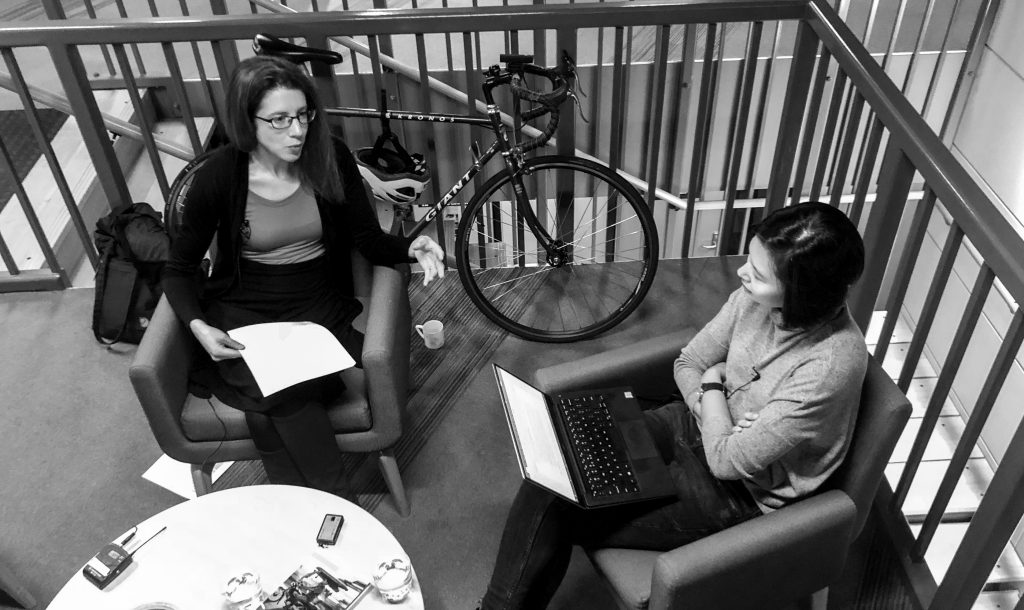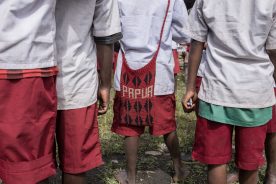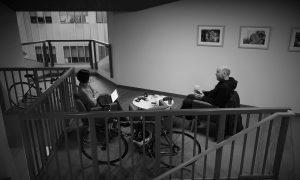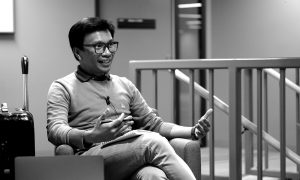Welcome to Part 4 of our special series of podcasts that take a look a The Philippines beyond the cliches. In this episode, New Mandala’s Philippines editor Dr Nicole Curato speaks with Dr Hannah Bulloch, an anthropologist at the Australian National University’s National Centre for Indigenous Studies, to problematise the notion that Filipinos look to America for ideas about economic and social development. The transcript below was prepared by Bianca Ysabelle E. Franco from Ateneo de Manila University; note that it has been lightly edited for clarity and may at points differ from the recording.
Nicole Curato [NC]: we are fortunate to have Dr Hannah Bulloch with us at New Mandala’s headquarters at the Australian National University. Hannah is the author of the book, In Pursuit of Progress: Narratives of Development on a Philippine Island. The book came out in 2017, published by the University of Hawaii Press. So, Hannah, thank you for joining us.
Hannah Bulloch [HB]: Hi, Nicole. Thanks for having me here.
NC: So, the myth or stereotype we’re unpacking in the next half hour is the concept of development in the Philippines and when I read your book, I kind of remembered my childhood growing up in Manila and I remember my parents getting so excited when the first branch of TGI Fridays opened up, when Burger King came to Manila, when we finally had cable and we were able to watch CNN, MTV, and HBO. And to me, it feels like these are all indications of my family, middle-class families’ aspiration of being like America. And in a way, I guess a lot of Filipino families share this, that when you think of development, we look to the US. And of course, now, it’s kind of funny for me thinking about this so when I read your book about the various complex narratives of development, it feels like this myth or stereotype is challenged. So, tell us about the research.
HB: Thanks, Nicole. So, I think it’s useful to start out by taking a step back from this concept of development. Because on one level, that something called “development” exists in the world seems like common sense, right? Development seems like a thing, a process that we can objectively observe in the world. And a lot of the time, scholars do use the concept of development in exactly that way, as an analytical category, a framework, if you like, through which we understand the world. But in the 1990s, academics who become known as post-development scholars turned development into an object of analysis. So, rather than using it as an analytical category to understand the world, they actually scrutinised the concept of development itself.

Dr Hanna Bulloch
They asked, you know, “What do we mean when we talk about development and modernisation, progress?” And they point out that the dominant notion of development is very much a Euro-American construct, or at least it has its origins in a Euro-American history. So, it’s a metaphor in a sense that we used to make sense of the world, to help us cognitively—or to help us cognitively organise or map differences between people and places and over time. But it’s not the only lens through which we could understand those differences. But in constructing these notions of development or notions of progress, Euro-American societies placed themselves at the top of the development hierarchy and they assumed that everyone else should want to aspire to be like them. And in places like the Philippines that we colonised by Spain and the US, these ideas were really influential and very much communicated through to people through the education system, among other things.
Now, over the 20th century, notions of development became more nuanced and more complex. And there was—there became a greater focus on local knowledge and local ideals. But the origins of concepts of development and progress in Euro-American thought still fundamentally influenced the way people think about it on some level. So, there are all manner of assumptions that we make about development and this includes things like, that societies start out poor and develop over time and become wealthier over time. So, poverty is framed as an original state. Another assumption is that becoming developed means ever-increasing levels of consumption, of urbanisation, of industrialisation. And the concept of progress in particular also often draws on spatial metaphors. This idea that progress is a linear path that societies travel over time. Or it is sometimes conceived as an upward movement from poverty towards wealth.
So, to be clear, the post-development scholars weren’t saying that inequality doesn’t exist, but they were saying that some of the assumptions that we make about development are not the only way that we could understand it. So, reading this work that deconstructed the notion of development, I became really interested in this idea that if development is a social construct, if it’s a human invention, if you like, then different societies are gonna have different understandings of it. They may have, to some extent, adopted that Euro-American dominant idea of development because it’s so ubiquitous and so often repeated throughout the world. But they’re always gonna understand it in relation to their own local concepts and local worldviews. Or they may have their own pre-existing notions of something that looks a lot like progress or development.
So, I focused in particular on a part of the Philippines called Siquijor and I became really interested in learning what are local notions of development in this area and how do these notions of development influence people’s sense of identities, their understandings of their past, their futures, and their place in the world. So, for example, I think one of the things that led me to think about this, there’s a Nepalese scholar Nanda Shrestha, sorry if I pronounced this incorrectly. And he talked about his childhood in Nepal, during which time he came to realise that he belonged to this category, “underdeveloped”. And he said that poverty had never seemed dehumanising to him until that point. And for this huge category of people, which was most of the world’s population, their ascribed identity becomes defined in terms of deficit, in terms of what they aren’t, of what they don’t have.
So, when I did research on Siquijor, I asked people what development or what kalamboan looked like to them. So, that’s the Cebuano concept of development. And I also asked people what kind of lives they wanted for themselves and their family. So, interestingly, most people replied that they wanted “ang simpul nga kinabuhi”, the simple life. And this entailed having a modest house, like living in a nipa hut, having some backyard animals, being able to send their kids to school and afford healthcare, having enough to eat, so it connoted sufficiency but not excess. And one of the other really important aspects for people of the simple life was having good relationships with friends and family, having time for family and for community. At the same time, interestingly enough, I also paid close attention to what people actually spend their money on when they come into some money, right? And I observed that—so, I was working in an area where people—some people’s incomes were increasing considerably through remittances sent home and one of the most common things that people were doing with that money was building large concrete houses and filling them with items that sort of indicated some status, if you like. So, sometimes, you know, appliances that they didn’t necessarily use very much. And you know, I did a census of the village.
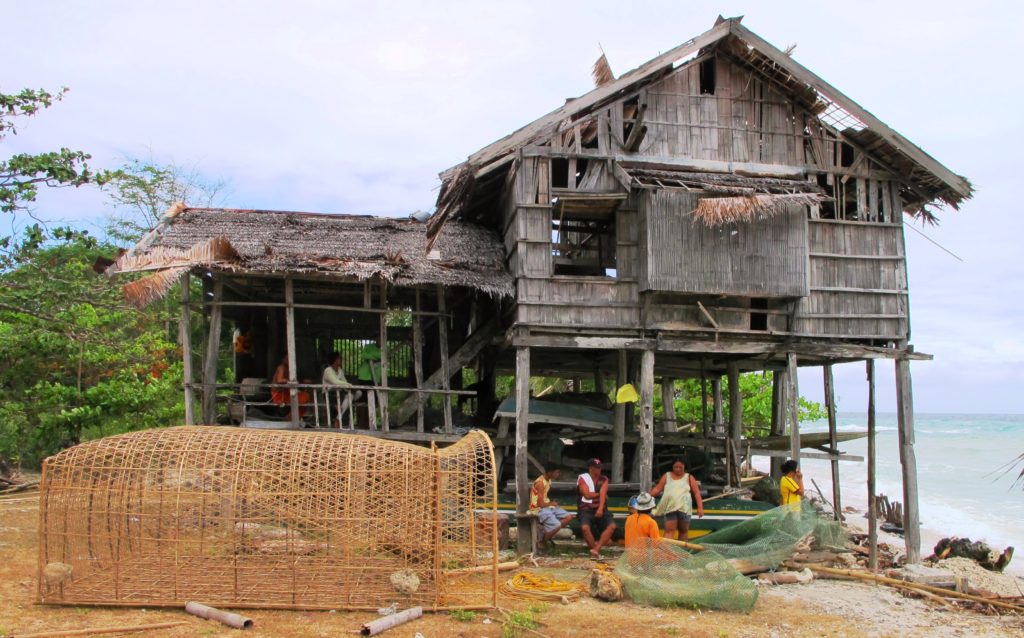
Fishermen waiting at Cang-isok to take their fish trap out to sea. Cang-isok is one of the oldest houses on Siquijor. (Photo: Hannah Bulloch)
So, I actually visited every single house in the village that I lived in. That was about 150 households and some people lived in these nipa huts made out of locally made materials so woven bamboo, nipa is the roofing material, and you know, other people lived in these concrete houses with metal roofs. And it pretty quickly became apparent that the more comfortable houses to live in were actually the bamboo houses because they could breathe and most people didn’t have air conditioning and it wasn’t a steady supply of electricity. So, in fact—and a lot of people—because I myself lived in a nipa hut and people would often say to me, “Oh, nipa huts are much more comfortable, they’re much more practical.” But at the same time, that wasn’t what people would spend their money on when they had the choice. So, I didn’t necessarily understand this as people contradicting themselves. But I think that people do have competing visions of the good life. And you know, these different visions express themselves as different times in different ways, right? And I noticed in particular that there was a lot of ambivalence around the value of individualism in particular. So, I mentioned that the idea of the simple life, one important aspect of this, is being able to have time for friends and family. And one of the things people said to me is, “You know, if you’re always out earning money and if you’re always worrying about your business, you won’t have time for your friends and family.” At the same time, people you know, did see increased incomes as part of development. So, there was kind of this real ambivalence about what, you know, about the place of individualism in society. It was seen as something that’s allowed somewhere like the US to become wealthy but at the same time, people weren’t at all certain that it was a virtue.
NC: Right. I think I find that interesting because it’s a good counter-narrative to this perspective that all Filipinos aspire to follow the trajectory of the US, which as you mentioned, theoretically, hasn’t always been the trajectory, especially for post-development scholars, that there are various interpretations of what a good life means. I remember reading in one of your articles, you were quoting one of your respondents named Luz, who was saying, “If you lived a simple life, you will have good relationships with family, neighbours, and friends, but if you’re rich, you’ll always be bickering with people.” So, in a way, there’s this moral calculation of what wealth or aspiring for wealth does to social relationships, which may mean more for communities. So, tell us more about these other ethical ambiguities or moral perspectives that people bring in to their respective concepts of development.
HB: I think I felt that one of the really interesting, probably sometimes quite problematic ways that this played out was in relation to identity and how they understood—how people understood themselves in comparison to Americans. So, you know when I asked people, “Why do you think some places are rich and some places are poor?”, people often answered me with things like, “You know, in places like America, people cooperate and they cooperate to make their place wealthy. Whereas, we Filipinos, we don’t cooperate with one another.” And you know, I heard a lot of kind of disparaging remarks that people made about what some people called the sort of Filipino personality. In fact, this was a term that often came up, the Filipino personality. You know, they’d say, “We have crab mentality, we bicker with one another, we can’t cooperate, we’re lazy—” I heard that one sometimes as well, “We’re lazy.” You know, “If you’re lazy, you’ll never progress.” People said to me. But interestingly, at the same time—I mean I should point out to listeners that—so, I’m from New Zealand, I’m Pakeha, which is a New Zealander with European descent, so I’m Caucasian and so the people who I was working among considered me Amerikana and they often referred to me as the Amerikana and I would have to correct people and say you know, “Dili ko Amerikana. Taga-New Zealand ko.” I’m from New Zealand. Then people would say to me, “Oh, that doesn’t matter. You’re still part of the American race.”
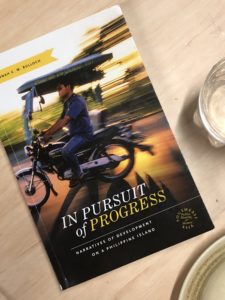 So, I also was interested in how people interacted with me as a you know, as an Amerikana. And people sometimes said to me things like, “You know, in your place, people don’t look after their family. Here in the Philippines, we look after our family. That’s really important to us.” And you know, there was just this subtle kind of things that came through about the assumptions of what you know, what my place was like, that just felt like this critique in a way of American society at the same time. And I talk about a range of these aspects in the book.
So, I also was interested in how people interacted with me as a you know, as an Amerikana. And people sometimes said to me things like, “You know, in your place, people don’t look after their family. Here in the Philippines, we look after our family. That’s really important to us.” And you know, there was just this subtle kind of things that came through about the assumptions of what you know, what my place was like, that just felt like this critique in a way of American society at the same time. And I talk about a range of these aspects in the book.
So, I think there’s kind of this constant playing out of this tension between thinking about the ways in which a society might progress through focus on money and how they might act against it. But I think those questions of identity were also really important to me. I was quite concerned about the way that people negatively compared themselves to Americans in ways that I think are very much ingrained through some of these deficit discourses that come through in these sort of traditional ideas of development and progress, that idea that you’re constantly comparing yourself and finding yourself falling short. And some of that is kind of grounded in an idea that people can pull themselves up by their bootstraps if you like, and ignoring those wider socio-economic structures.
Obviously, we know that people in the Philippines work really hard, right? And it doesn’t always mean that… you know if you’re a poor farmer you can work hard, it doesn’t always mean that you’re going to be able to make a better life for yourself or make a—or be able to achieve the levels of wealth that you might like. Yeah, I think those notions of development kind of sometimes focus quite heavily on people and communities as units responsible for their own progress without looking at those broader structures in which people are living can be quite problematic for a sense of identity as well.
NC: Yeah, I mean I think in the piece and anthropological forum that you published, you did unpack the concept of colonial mentality and how a lot of nuances are part of that process. I mean, you mentioned earlier that they were referring to you as an Amerikana and the ways in which Filipinos look to America is that it’s the white racial other. But on the other hand, you also make an argument that it’s somehow connected to the concept of selfhood. Can you unpack that for us?
HB: Yeah, so I mean this is one of the things that actually interested me when I first went there. So, I should mention that I first went to the Philippines in 2004 and I lived there for about 2 years altogether.
NC: Is this in Siquijor already?
HB: Yeah, in Siquijor. And you know, I found that people didn’t ask me a lot of questions about where I had come from and about my place and this—I wasn’t actually the first person to experience this. There was an anthropologist who had worked on the island a couple of decades before and he actually mentioned the same thing. But he—I think he also talked about it in terms of this idea that people felt that they knew the US and part of the reason I think for this is because—I mean you could correct me if I’m wrong but growing up in the Philippines where it’s so heavily influenced by the American curriculum, for example so heavily has influenced the Philippine curriculum and there’s a range of ways that the Philippines is culturally orientated towards the US, means that people do have a sense of knowing the place. But at the same time, it stands as a kind of a wealthy other. Or sometimes as utopic kind of other. This idealised America and so—
NC: But do you sense an aspiration to become the other? To become America?
HB: No. I think—well, yes and no. I mean I think people still wanna be maybe a different version of themselves. I mean I got this—it’s like a lot of people wanted to migrate to the US and live there for a period of time but a lot of people also said to me they ultimately wanted to retire in the Philippines.
NC: And I think this ties back to the observations you put forward in the book that inasmuch as there is this concept of progress, there is this counter-narrative of—a counter-narrative against the relentless pursuit of wealth, of just accumulating resources because there are higher values prized by particular communities. And out of curiosities, of all field sites you can choose, why did you pick Siquijor as a field site?
HB: Siquijor? (laughs)
NC: In the series, we will hear from Clarke Jones who’s done an ethnography of prisons. So, I think my curiosity here is the choice of field site. It’s not just for the beaches, is it? (laughs)
HB: (laughs) No, it wasn’t. Actually, you know what, I never really even liked beaches that much when I was growing up. So, I often thought it was a bit funny that I actually ended up on a beach island like Siquijor. But one of the first ethnographies I read of the Philippines was Jean Paul Dumont’s Visayan Vignettes which is what I was mentioning a moment ago and he did field work on Siquijor in the early 1980s and he just produced this absolutely beautiful ethnography of the island. Beautifully written, well thought through and so I think that was my first introduction to Siquijor which created intrigue for me to some extent. And some listeners may also be aware that Siquijor is renowned as a place of traditional healing. But it even has a reputation for sorcery and witchcraft and sort of generally hyperactive paranormal activity. And this in itself has attracted quite a few anthropologists, particularly anthropologists of religion and of medicine over the years. But I think it’s worth pointing out that Siquijor is not really different from other parts of the Philippines in terms of religion. Even through it has this reputation, it’s a predominantly Catholic island and it has what Cornelio describes as everyday Catholicism, Catholicism integrated with animist beliefs.
So, what interested me I think was the association between some of those animist beliefs – from an outside perspective – so, the way that people make these assumptions about belief on Siquijor and how they associate that with concepts of backwardness and underdevelopment. And I thought, you know, how did people actually—how do people on Siquijor actually negotiate those tensions and understand some of those relationships in the context of their everyday lives and when they go off the island and they have to negotiate those tensions. So, that was one of the things I think that interested me. And there was also a fair amount of development activity happening on the island so when I first went there in 2004, it was a pilot project for Kalahi-CIDSS, the World Bank-engineered and the government of the Philippines development project that was subsequently rolled out across thousands of barangays in the Philippines. So, there was that major project that was taking place on Siquijor. There were various other government and NGO projects there that I thought, “Well, this could be interesting for my study.”
NC: And of course, I think one of the most powerful things about your work is it’s ethnographically driven. And I think I have a lot of admiration for ethnographers because it really just disrupts our taken for granted assumptions of what a good life looks like. And I think I wonder how your work can speak to the more dominant narratives of what economic developments in the Philippines should look like. How do we speak to economists or political economists who kind of prescribed a certain way for the country to progress, whether it’s through, I don’t know, export-oriented industrialisation or labour migration or imposing taxes on sugary drinks to finance the healthcare system? These are all policy interventions that come from a technocratic perspective. I wonder, then, from an ethnographer, what kinds of contributions or assumptions we can challenge and to speak to these dominant discourses of development?
HB: You know, I think it’s important for us to not assume we know what development should look like to people. And actually asking people what it means to them is a really important aspect. But even within that, people will—because as I explained, people will not necessary hold a single notion of development. So, I think we have to be attentive to the fact that sometimes we may be hearing what we are expecting to hear or wanting to hear, so looking for those subtleties and I think that anthropologists, through the ethnographic method have a particular role to play in bringing some of those nuances out and actually translating them to policy makers and to people in other disciplines as well.
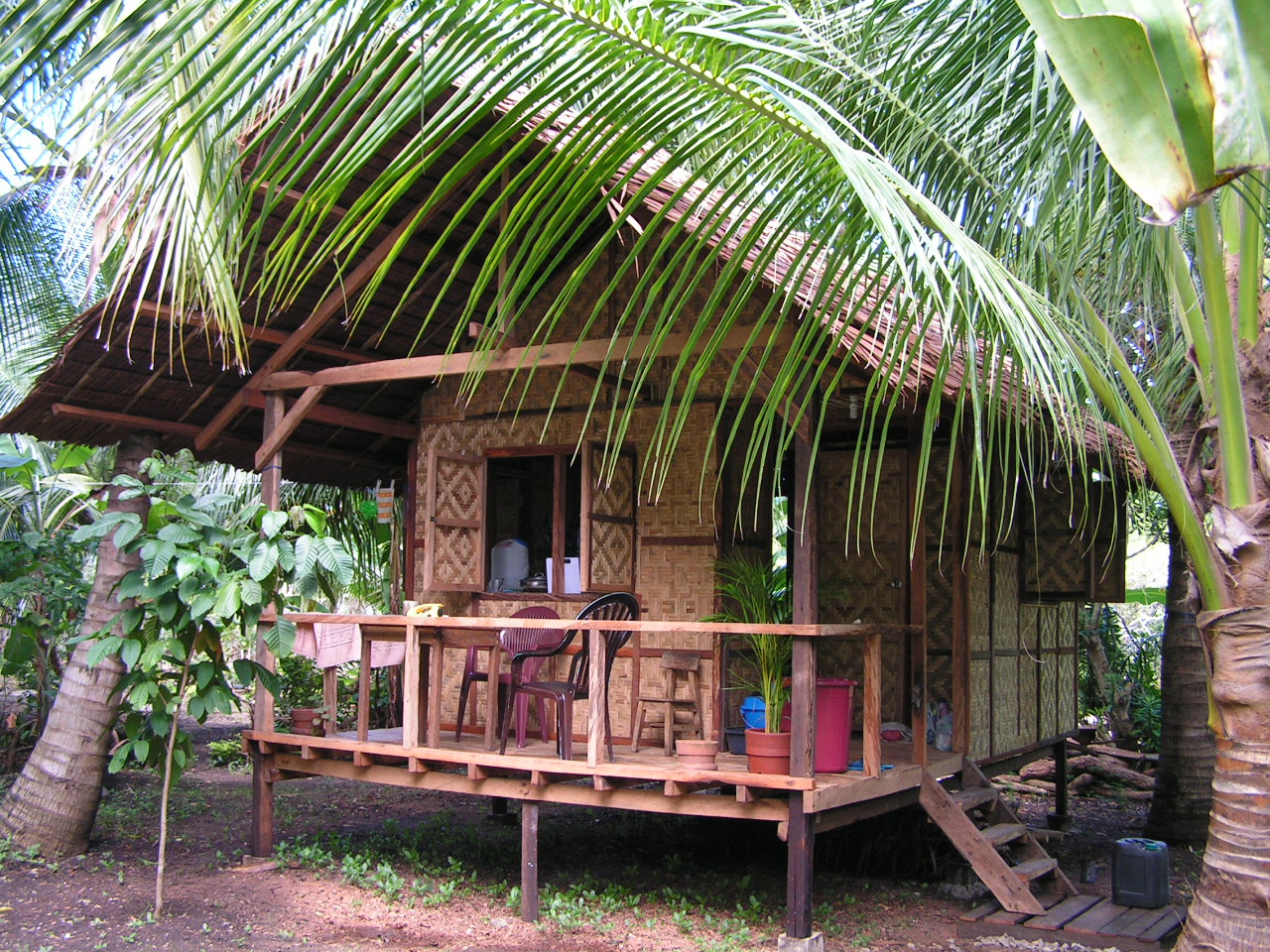
Hannah’s nipa hut on Siquijor (Photo: Hannah Bulloch)
NC: So, if there are other stereotypes we can have coming from the perspective of doing field work in Siquijor, what other myths or stereotypes you can have? Because some of the stuff I can think of is there’s always this, like what you said, a pathologising or disparagement of the rural way of life, on how this way of life should change and how there should be bigger companies that organise small-scale fishing or how there should be tourism boom with the very beautiful islands. So, how do we speak to these prescriptions?
HB: You know, people talked about these things on the island. On one level, they want more tourism coming to the island but they were very adamant in saying, you know they didn’t want the island to become like Boracay or certain other parts of the Philippines where they felt had become overrun with tourism. More that they do want jobs and secure livelihoods but that doesn’t necessarily mean that they want more urbanisation and industrialisation. So, I think one of the stereotypes that I feel is really important to be challenged is this idea
Education on the fringe in Indonesia
A snapshot of the problems of Indonesia's education system from highland Papua.
NC: Right. That’s actually a super important insight because when we talk about rural contexts like Siquijor, it’s always seen through the lens of poverty, income generated by the island rather than thinking about it in relational terms, as you mentioned. And I think that’s a powerful challenge to the dominant narrative of development in the Philippines.
HB: And I think, you know, with somewhere like Siquijor, because it’s an island, the mistake is sometimes made that it’s an isolated place and it’s not. I mean, it’s totally integrated with the global economy. Farmers are selling copra on an international market, for example. So, in somewhere like Siquijor, it’s already embedded in these relations of inequality and they’re often being exploited in the context of that.
NC: Right. Well, I think we’ve challenged so many stereotypes in this discussion. I surely learned a lot. So, I think just to wrap this up, I would like to ask you again, to what extent is the stereotype true that when we talk about development in the Philippines, we always look to the United States?
HB: Look, I think some utopic ideals of the US certainly influenced Filipinos’ notions of development but it’s much more complex because many people are also deeply uneasy about the adoption of American values and American ways of life.
NC: Alright. Thank you, Hannah! Hannah Bulloch is the author of the book, Pursuit of Progress: Narratives of Development on a Philippine Island. Thank you for listening!
HB: Thanks, Nicole!
 Facebook
Facebook  Twitter
Twitter  Soundcloud
Soundcloud  Youtube
Youtube  Rss
Rss 